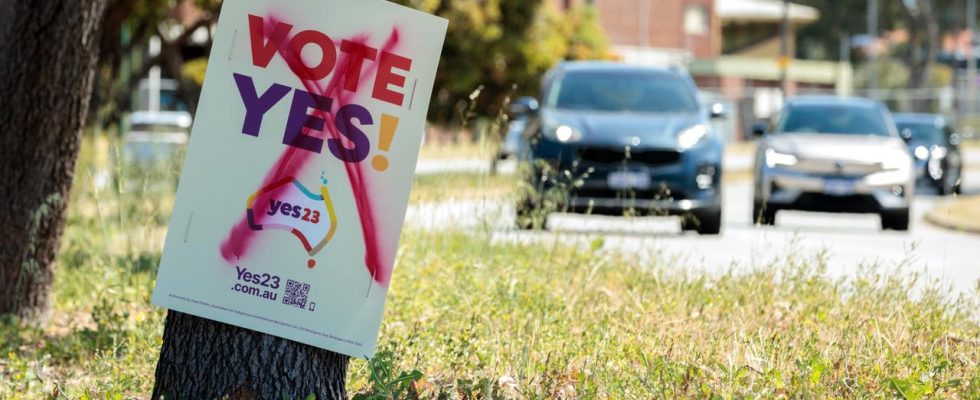Australia’s indigenous people should have more political influence with a constitutional change. But a majority voted against the plan in a referendum. It is a heavy defeat for Prime Minister Albanese.
Australia’s indigenous peoples will not have a greater political say in the future. This is the result of a historic referendum. A clear majority of the 18 million eligible voters – including 530,000 indigenous people – spoke out against the plan in the so-called voice referendum.
According to preliminary results, all six states also voted against it. In order to change the constitution, a double majority is required in Australia: Not only must more than 50 percent of all voters say “yes”, the majority of the states must also be in favor.
“Voice to Parliament” was intended to advise MPs
Specifically, it was about whether the “First Nations” should have a say in parliament in the future, as enshrined in the constitution. If successful, a body elected by them – the “Voice to Parliament” – would have advised Parliament on issues that directly affect indigenous people. It would then have been left to the MPs to follow the advice or not.
Proponents of the constitutional amendment hoped that greater inclusion of Indigenous opinions would help improve the lives of Indigenous people. However, the conservative opposition in particular had raised massive opposition to the plans in recent months. They warned of special privileges for the indigenous population. After the majority of Australians initially leaned toward a “yes” vote, opinion in the country shifted. Some indigenous people were also against it. The plan didn’t go far enough for them.
Heavy defeat for Prime Minister Albanese
For Prime Minister Anthony Albanese, who fulfilled an election promise with the referendum – the first in Australia in 24 years – the “no” vote is a serious defeat. Albanese had been promoting his cause for months. Just a few days ago he took part in a ceremony with representatives of the indigenous peoples at Uluru (formerly called Ayers Rock).
On the morning of the vote, he made an emotional appeal to voters, asking them to correct a mistake in history. “In this week of all times, when there is so much hate in the world, this is an opportunity for Australians to show kindness,” he said. “This referendum is the chance to make history.”
Prime Minister Albanese worked hard to ensure that the referendum was a success – and failed.
The vote is about respect for the indigenous people. It’s about “how we see ourselves as a nation, but it’s also about how the world sees us,” said Albanese. “The chance to accept the dignified invitation of the first Australians to recognize them in our founding document.” The indigenous people finally wanted to be heard and have a voice when it came to their own concerns.
Shortly after the result was announced, the first voices began to be heard calling for the Prime Minister to resign. The 60-year-old, however, said in an emotional speech that he respected the result, but would continue to work for reconciliation with the indigenous people and an end to the divide in society. “I did everything I could do.” Indigenous Australians Minister Linda Burney tearfully spoke of a “sad day for Australia”.
Long period of oppression
The Albanese government’s stated aim is to improve the reality of life for disadvantaged and discriminated against population groups. Today they make up around four percent of the population. In many places they live on the fringes of society. Indigenous Australians are considered the oldest surviving culture in the world and have inhabited the continent for more than 60,000 years.
With colonization by the British in the late 18th century, a period of severe oppression began for them. They are not even mentioned in the constitution adopted in 1901. They were only granted civil rights in 1967. Until the 1970s, indigenous children were also taken away from their families to be “re-educated” in Christian institutions or with white families. It was only in 2008 that the government under then Prime Minister Kevin Rudd apologized for the suffering caused to the victims of the “Stolen Generation”.

